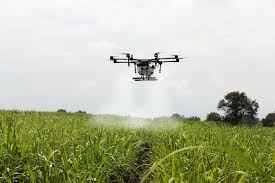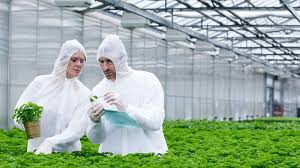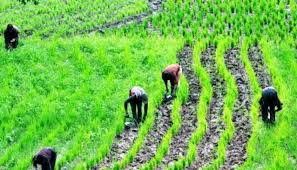As the global population continues to grow, reaching an estimated 9.7 billion by 2050, the demand for food is increasing at an unprecedented rate.
This growth presents significant challenges for agricultural systems worldwide, necessitating innovative approaches to meet rising food needs while ensuring sustainability. The future directions of agriculture will focus on integrating technology, improving efficiency, and adopting sustainable practices to address these challenges.
Technological advancements are set to play a vital role in shaping the future of agriculture. Precision agriculture, which utilizes data and technology to optimize farming practices, is becoming more prevalent.
Farmers can leverage tools like drones, satellite imagery, and sensor technologies to monitor crop health, manage resources, and increase yields. These innovations not only enhance productivity but also minimize the environmental impact of farming by promoting efficient resource use.
Moreover, sustainable agricultural practices are gaining momentum as climate change intensifies. Future agricultural systems must prioritize soil health, biodiversity, and water conservation to ensure long-term viability.
Techniques such as agroecology, organic farming, and regenerative practices will be essential in creating resilient food systems that can adapt to changing environmental conditions.
Additionally, the integration of biotechnology and genetic engineering holds promise for developing crop varieties that are resistant to pests, diseases, and extreme weather conditions. These advancements can significantly improve food security and reduce reliance on chemical inputs.
The future directions of agriculture will revolve around leveraging technology, adopting sustainable practices, and embracing innovative solutions. By focusing on these areas, the agricultural sector can effectively address the challenges posed by a growing population while ensuring a healthy planet for future generations.
Technological Innovations in Agriculture

Technological innovations are transforming the agricultural landscape, improving efficiency and productivity. Here are some key innovations to watch for:
1. Automation: Robotics and automation technologies are being increasingly utilized in farming tasks such as planting, harvesting, and monitoring crops.
2. Data Analytics: Data-driven decision-making is becoming essential. Farmers use analytics to assess crop health, optimize resources, and enhance yields.
3. Drones: Drones are used for crop monitoring, mapping fields, and assessing plant health, enabling farmers to make informed decisions quickly.
4. Genomic Technologies: Advances in genomic technologies are helping develop crop varieties with improved traits, such as disease resistance and drought tolerance.
5. Blockchain: Blockchain technology enhances transparency in the supply chain, helping track the journey of agricultural products from farm to table.
Sustainable Farming Practices
Sustainable farming practices are crucial for the future of agriculture, ensuring the preservation of resources and ecosystems. Here are some essential practices:
1. Crop Rotation: Rotating different crops helps maintain soil health and reduces the risk of pests and diseases.
2. Organic Farming: Organic farming practices reduce chemical inputs, promoting biodiversity and soil health.
3. Agroforestry: Combining trees with crops and livestock enhances biodiversity, improves soil quality, and provides additional income sources.
4. Conservation Tillage: Minimizing soil disturbance through conservation tillage helps preserve soil structure and prevent erosion.
5. Integrated Pest Management (IPM): IPM focuses on using a combination of biological, cultural, and chemical methods to manage pests sustainably.
Climate Change and Its Impact on Agriculture
Climate change poses significant challenges to agriculture, affecting productivity and sustainability. Here are some key impacts:
1. Changing Weather Patterns: Altered rainfall patterns and increased temperatures affect crop yields and livestock productivity.
2. Water Scarcity: Climate change can exacerbate water shortages, making irrigation more challenging and affecting crop growth.
3. Soil Degradation: Extreme weather events can lead to soil erosion and degradation, reducing land productivity.
4. Increased Pest Pressure: Warmer temperatures may lead to increased pest populations, requiring more robust pest management strategies.
5. Adaptation Needs: Farmers will need to adapt their practices to mitigate the effects of climate change, such as adopting drought-resistant crop varieties.
Urban Agriculture: The Rise of City Farming
Urban agriculture is gaining traction as cities seek sustainable food solutions. Here are some highlights of urban farming:
1. Food Accessibility: Urban agriculture increases food accessibility in cities, providing fresh produce to urban populations.
2. Community Engagement: City farming initiatives foster community engagement and collaboration among residents.
3. Waste Reduction: Urban farms can utilize organic waste for composting, reducing landfill waste and enriching soil.
4. Space Utilization: Rooftops and vacant lots are increasingly being transformed into productive green spaces.
5. Economic Opportunities: Urban agriculture creates jobs and stimulates local economies, contributing to urban development.
Precision Agriculture: Enhancing Efficiency
Precision agriculture employs technology to enhance farming efficiency, maximizing resource use and minimizing waste. Key elements include:
1. GPS Technology: Farmers use GPS to map fields accurately, allowing for targeted applications of inputs such as water and fertilizers.
2. Remote Sensing: Remote sensing technologies help monitor crop health and soil conditions, enabling timely interventions.
3. Variable Rate Technology: This technology allows farmers to apply fertilizers and pesticides at varying rates based on specific field conditions.
4. Soil Sensors: Soil sensors provide real-time data on moisture levels and nutrient content, guiding irrigation and fertilization decisions.
5. Yield Mapping: Analyzing yield data helps farmers identify areas for improvement and optimize future planting strategies.
Read Also: Tangerine and Mandarin Leaves: Economic Importance, Uses and By-Products
Genetic Engineering and Biotechnology in Crop Production

Genetic engineering and biotechnology play a pivotal role in modern agriculture, enhancing crop production and sustainability. Here are some key aspects:
1. Improved Crop Varieties: Genetic engineering allows scientists to create crops with desirable traits, such as increased resistance to pests and diseases or improved nutritional content.
2. Drought Resistance: Biotech crops can be engineered to withstand drought conditions, ensuring food security in areas facing water scarcity.
3. Reduced Chemical Use: By developing pest-resistant varieties, farmers can reduce their reliance on chemical pesticides, benefiting the environment and reducing costs.
4. Enhanced Yields: Biotechnology can lead to higher crop yields, helping meet the growing global food demand.
5. Nutritional Enhancement: Crops can be fortified with essential vitamins and minerals through genetic engineering, addressing malnutrition in various populations.
Alternative Protein Sources and Plant-Based Foods
As awareness of health, environmental, and ethical issues increases, alternative protein sources and plant-based foods are gaining popularity. Key points include:
1. Health Benefits: Plant-based diets are associated with various health benefits, including lower risks of chronic diseases, making them attractive to consumers.
2. Environmental Impact: Plant-based proteins generally have a lower environmental footprint compared to animal proteins, requiring less land and water.
3. Diverse Options: Alternative protein sources, such as legumes, nuts, seeds, and soy products, offer a variety of options for consumers.
4. Innovation in Food Products: Food companies are developing innovative plant-based meat alternatives that mimic the taste and texture of animal products.
5. Market Growth: The demand for plant-based foods is driving market growth, leading to increased investment and research in alternative protein sources.
Water Management Strategies for Sustainable Agriculture
Effective water management is crucial for sustainable agriculture, especially in the face of climate change and water scarcity. Here are essential strategies:
1. Drip Irrigation: This method delivers water directly to the plant roots, minimizing water loss and ensuring efficient use of resources.
2. Rainwater Harvesting: Collecting and storing rainwater can supplement irrigation needs, especially in regions with seasonal rainfall.
3. Soil Moisture Monitoring: Using sensors to monitor soil moisture levels helps farmers optimize irrigation schedules and reduce water waste.
4. Crop Selection: Choosing drought-resistant crops can reduce water consumption and enhance resilience to water scarcity.
5. Conservation Tillage: Minimizing soil disturbance improves water retention and reduces erosion, contributing to better water management.
The Role of Artificial Intelligence in Farming
Artificial intelligence (AI) is transforming agriculture by enhancing decision-making processes and improving efficiency. Key roles of AI in farming include:
1. Predictive Analytics: AI algorithms analyze data to predict crop yields, pest outbreaks, and disease occurrences, allowing farmers to make informed decisions.
2. Precision Farming: AI-powered tools help optimize resource use, such as water and fertilizers, by providing precise recommendations based on real-time data.
3. Automation: AI-driven robots can perform various tasks, including planting, harvesting, and monitoring crops, reducing labor costs and improving efficiency.
4. Climate Adaptation: AI can help farmers adapt to changing climate conditions by providing insights on crop management and risk assessment.
5. Supply Chain Optimization: AI improves supply chain efficiency by analyzing market trends and consumer preferences, helping farmers make strategic decisions.
Read Also: Tangerine and Mandarin Trunk: Economic Importance, Uses and By-Products
Global Agricultural Policies and Their Future

Global agricultural policies play a critical role in shaping the future of agriculture. Key trends in agricultural policies include:
1. Sustainability Focus: Many countries are prioritizing sustainable agricultural practices to address environmental concerns and promote food security.
2. Support for Smallholder Farmers: Policies aimed at supporting smallholder farmers are essential for improving livelihoods and enhancing food production in developing countries.
3. Climate Change Mitigation: Agricultural policies are increasingly incorporating strategies to mitigate climate change impacts, such as promoting agroecological practices.
4. Research and Development Funding: Investing in agricultural research and development is crucial for fostering innovation and improving crop productivity.
5. Trade Policies: Global trade agreements impact agricultural markets, and future policies will need to balance trade with domestic food security needs.
Trends in Organic Farming
Organic farming continues to grow as consumers seek healthier and more sustainable food options. Key trends in organic farming include:
1. Increased Demand: The demand for organic produce is rising, leading to more farmers transitioning to organic practices.
2. Certification Programs: Many countries have established certification programs to ensure that organic products meet specific standards, boosting consumer trust.
3. Crop Diversity: Organic farmers often practice crop diversity, which enhances soil health and reduces pest pressure.
4. Sustainable Inputs: Organic farming emphasizes the use of natural inputs, such as compost and biological pest control, promoting ecosystem health.
5. Education and Awareness: Increased consumer awareness of the benefits of organic farming is driving demand and encouraging more farmers to adopt organic practices.
The future of agriculture is shaped by technological innovations, sustainable practices, and changing consumer preferences. Genetic engineering and biotechnology are enhancing crop production, while alternative protein sources and plant-based foods are gaining traction.
Effective water management strategies and the integration of artificial intelligence are crucial for sustainable farming. As global agricultural policies evolve, they will support these trends, fostering a resilient and sustainable agricultural system.
The future of agriculture is characterized by technological innovations, sustainable practices, and a response to climate change challenges. As the global population grows, agriculture must adapt to ensure food security while protecting the environment.
Urban agriculture and precision farming will play crucial roles in shaping the agricultural landscape, fostering resilience, and enhancing efficiency. By embracing innovation and sustainability, agriculture can pave the way for a more secure and prosperous future.
Do you have any questions, suggestions, or contributions? If so, please feel free to use the comment box below to share your thoughts. We also encourage you to kindly share this information with others who might benefit from it. Since we can’t reach everyone at once, we truly appreciate your help in spreading the word. Thank you so much for your support and for sharing!
Read Also: How To Generate Money From Medical Wastes
Frequently Asked Questions
We will update this section soon.

